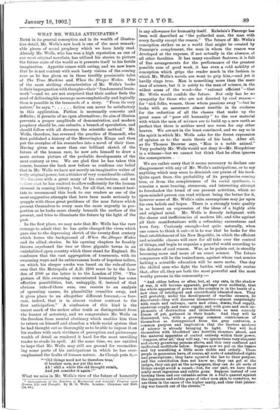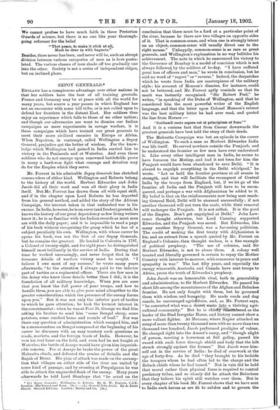WHAT MR. WELLS ANTICIPATES.*
BOTH in its general conception and in its wealth of illustra-
tive detail, Mr. Wells's new book is one of the most remark- able pieces of social prophecy which we have lately read.
Already Mr. Wells, who has won a high reputation as one of our most original novelists, has utilised . his stories to picture the future state of the world as it presents itself to his fertile
imagination. Appetite comes with eating, and we now learn that he is not content with 'such hasty visions of the coming• race as he has given us in those• terribly pessimistic tales of The Time Machine and , When the Sleeper Wakes. One of the most striking characteristics of Mr. Wells's books is their impregnation with thought—their" fundamental brain-
work "—and we are not surprised that their author feels the need of delivering his message more emphatically and logically than is possible in the trammels of a story. ." From its very nature," he says," fiction can never be satisfactory in this application. Fiction' is necessarily concrete • and definite ; it permits of no open alternatives ; its aim of illusion prevents a proper amplitude of demonstration, and modern prophecy should be, one submits, a branch of speculation, and should follow with all decorum the scientific method." Mr. Wells, therefore, has reversed the practice of Sismondi, who first published a history of the Merovingian Kings and then put the overplus of his researches into a novel of their time. Having given us more than one brilliant sketch of the future of the human race, he now sets himself to draw a more serious picture of the probable developments of the next century or two. We are glad that he has taken this course, because the book now before us confirms our belief that in Mr. Wells we have not merely an imaginative writer of truly original power, but a thinker of very considerable calibre.
We disaccree with a great many of his .conclusions, and we I .elieve.that he has omitted to allow sufficiently for the human element in cctming history; but,' for; all that, we cannot hesi- tate to recommend this book to our readers as one of the most suggestive attempts that, have been made seriously to
grapple with those great problems of . the near future which present themselves to 'every man the . more urgently in pro- portion as he-looks more closely beneath the surface of the present, and tries to illuminate the future by the light of the past.
, In the first place, we may note that Mr. Wells has the rare courage to admit that . he has quite changed the views which
gave rise tothe depressing sketch of the twenty-first century which forms the background of ,When. the .Sleeper Wakes and its allied. stories. In his opening chapters he frankly -throws ;overboard the two or three, gigantic- towns in an
uninhabited open.country which there stand for England. He confesses that the vast aggregation of tenements, with its swarming _ways and its subterranean hosts of hopeless toilers, on- which his sleeper awoke was based on the rule-of-three sum that the Metropolis of A.D. 2100 must be to the Lon-
don. -of 1900 as the latter is to the London of 1700. "The picture of ;this ,swarming concentrated humanity has some effective possibilities; but, unhappily, if, instead of that
obvious rule-of-three sum, one resorts to an analysis of operating causes, its plausibility crumbles away, and it gives place to 'an altogether different forecast,—a fore- cast, indeed, that is in almost violent contrast to the first anticipation." 'A cOnfession of this kind is the surest mark of the seeker, after truth as distinguished from the hunter of notoriety, and we congratulate Mr. Wells on the freedom from mental obstinacy which enables him thus to return on himself and abandon a whole social system that he had thought out so thoroughly as to be able to impose it on
his readers with such vividness of perception and picturesque wealth of detail as rendered, it hard for the most unwilling reader to evade its spell. At the same time, we are entitled
to hope that Mr: Wells may still see ground for reconsider- ing some parts of his anticipation's in which he has over- emphasised the faults of human nature. As Clough puts it,— " 'Old things need not be therefore true,' 0 brother men, nor yet the new : Ah ! 'still a while the old thought retain, And yet .consider it again !"
What we miss in Mr. Wells's view of the future of humanity • Anticipations of the Reaction of Mechanical and Scientific Progress upon Human Life and Thought. By H. O. 'Wells. London : Chapman and Halt, [7s, lid.]
is any allowance for humanity itself. Rabelais's Panurge has been well described as "the pollarded man, the man with every faculty except the reason." The future of Mr. Wells's conception strikes us as a world that might be created by Panurge's complement, the man in whom the reason was developed at the expense, if not actually in the absence, of all other faculties. It has many excellent features, it is full of fine arrangements for the performance of the greatest possible sum of good work, it has even a cold nobility of conception which grips the reader much in the fashion in which Mr. Wells's novels are wont to grip him,—and yet it hardly rings true. Man is something more than the mere man of science, but it is solely to the man of science, in the widest sense of the word—the "rational efficient "—that Mr. Wells would confide the future. Not only has he no sympathy for those who are not directed by cool reason— for "sick folks, women, those whom passions away "—but he looks with an assurance almost terrible in its coolness for the reduction of all the classes that make up the great mass of "poor old humanity" to the raw material with which the men of science are to build up a new earth so perfect that there is neither need nor room for any other heaven. We are not in the least convinced, and we say so in the spirit in which Mr. Wells asks for the freest expression of opinion as to the main thesis of his book. After all, as Sir Thomas Browne says, "Man is a noble animal." Very probably Mr.' Wells would not deny it—Mr. Hoopdriver is a witness—but we cannot but think that he often ignores the consequences.: We . We are rather sorry that it seems necessary to declare our
disagreement with any of -Mr. Wells's anticipations, or to say anything which may, seem. to diminish our praise of his book. Quite apart 'from! the: probability of its prophecies coming
true, or from', the. completeness, of its social synthesis; it, remains a most bracing,- strenuous, and interesting attempt to foreshadow the trend of our present activities, which no open-minded person can read witllout . being the better for it, however some of Mr. Wells's calm assumptions may jar upon his own beliefs and hopes. . There is a strongly tonic quality in so honest an expression of the ideas of a highly able and original mind. Mr. Wells is fiercely indignant with the shams and inefficiencies of modern life, and tilts against all their manifestations with a refreshing earnestness and keen fury. Curiously enough—but quite naturally, when one comes to think it out—it is to war that he looks for the final establishment of his New Republic, in which the efficient and scientific classes will once for all take over the control of things, and begin to organise a peaceful world according to the dictates of cool reason. War, as he points out, is steadily becoming more and more of an exact science. The future conquerors will be the trained men, against.whom vast armies lacking a scientific education will be mere mobs. One day the skilled men who fight the battles will suddenly realise that, after all, they are both the most powerful and the most worthy persons in the community :—
"And either before or after, but, at any rate, in the shadow of war' it will become apparent, perhaps even suddenly, that the whole apparatus of power in the country is in the hands of a new class of intelligent and scientifically educated men. They will probably, under the development of warlike stresses, be discovered—they will discover themselves—almost surprisingly with roads and railways, carts and cities, drains, food supply, electrical supply, and water supply, and with guns and such im- plements of destruction and intimidation as men scarcely dream of yet, gathered in their hands. And they will be discovered, too, with a growing- common consciousness of themselves as distinguished from the grey confusion, a common purpose and implication that the fearless analysis of science 'is already bringing to light. They will tiud themselves with bloodshed and 'horrible disasters ahead, and the material apparatus of control entirely within their power. 'suppose, after.all,' they will say, 'we ignore these very eloquent and showy governing persons above, and this very confused and ineffectual multitude below. Suppose now we put on the brakes and try something. a little more stable and orderly. Those people in possession have, of course, all sorts of established rights and prescriptions ; they have squared the law to their purpose, and the ' constitution does not know us ; they can get at the judges, they' can get at the newspapers, they can do all sorts of things except avoid a smash—but, for our part, we have these really most ingenious and subtle guns. Suppose instead of our turning them and our valuable selves in a fool's quarrel against the ingenious and subtle guns of other men akin to ourselves, we use them in the cause of the higher sanity, and clear that jabber-, lug war tumult out of the streets."
We cannot profess to have much faith in these Pretorian Guards of science, but there is no one like your thorough- going reformer for the belief "Thet peace, to make it stick at all, Must be druv in with bagnets."
Besides, there never has been, and never will be, such an abrupt division between various categories of men as is here postu- lated. The various classes of men shade off too gradually one into the other. Society is not a series of independent ridges, but an inclined plane.







































 Previous page
Previous page